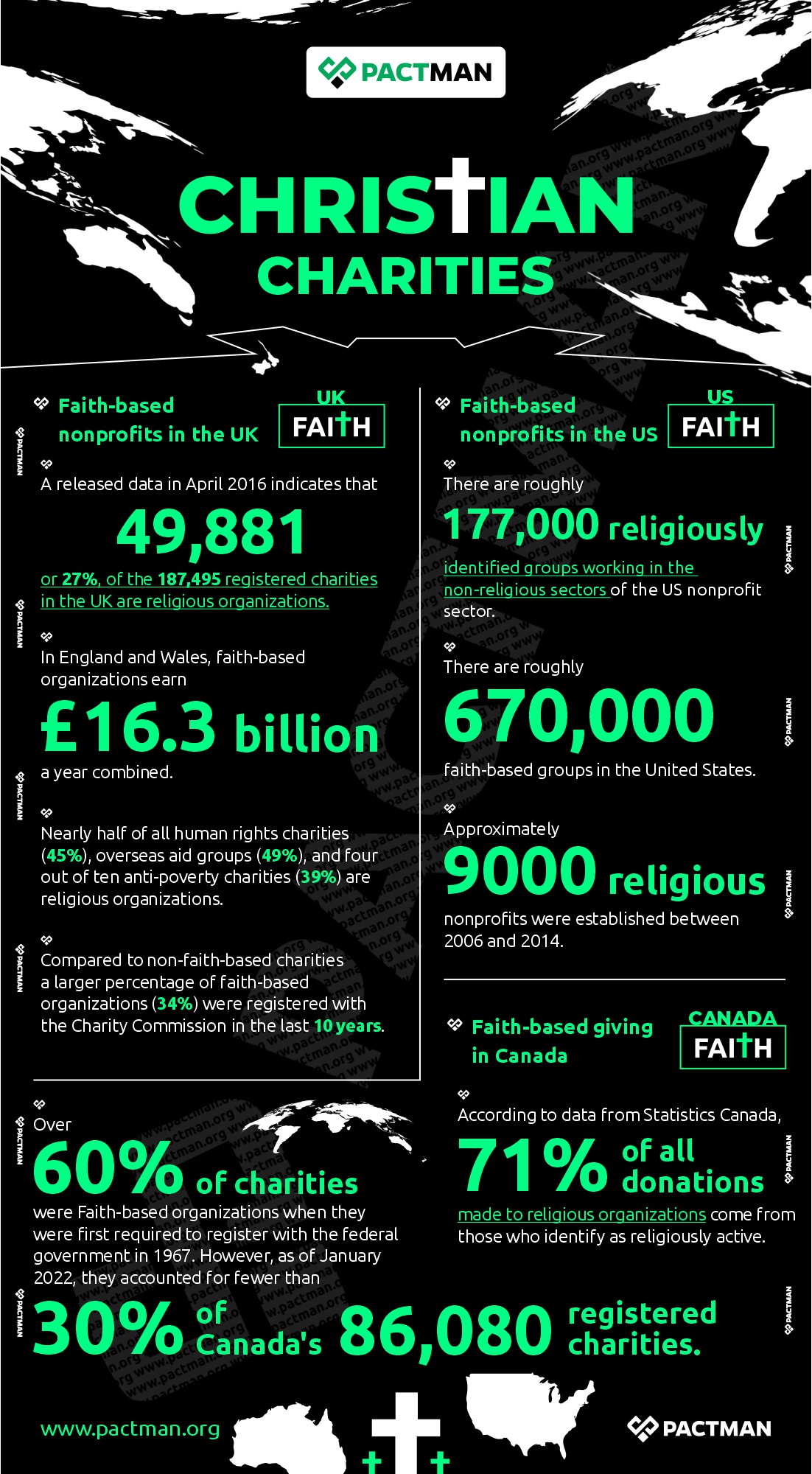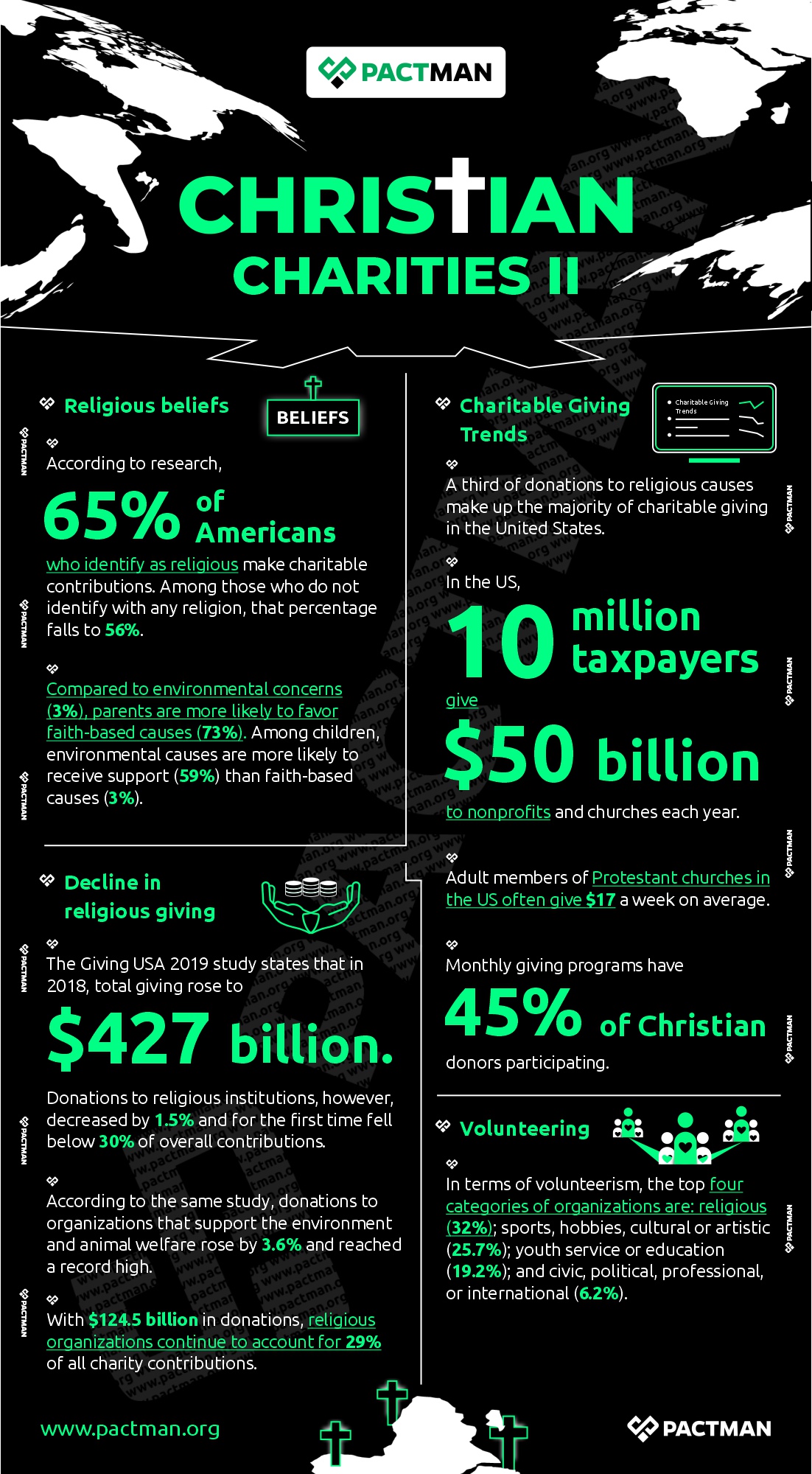I
Introduction
In Western societies, religious institutions have traditionally been important providers of resources for social welfare, including funds and services. Over the years, Christian charities were the birthplace of many early charitable and benevolent concepts. These organizations influenced the emergence of the need to assist others and, consequently, the foundation of social welfare.

Also, American social welfare has developed in large part as a result of Christian traditions and beliefs. By and large, these Christian charities do not just serve to uphold a specific social order but are motivated and driven by a sincere concern for others. These institutions constitute the founders of nearly all contemporary social services.
According to their scriptural constitution, the desire for increased effectiveness in ministering to the bodily needs of others led to the growth of the “early church.” Hence, the church is a powerful and influential organization in the formal social services and, to a larger degree, in the informal services.
This article will provide insight into the impact of Christian charities and their contribution to social welfare.
II
What are Christian Charities?
Christian charities are organizations that function according to their faith ideals and beliefs. Essentially, their work is motivated by their godly belief and they are frequently associated with churches or synagogues. These nonprofit organizations offer food assistance, shelter, healthcare, education, disaster relief, and community development initiatives, among others, to assist people and communities.

Christian charities are dedicated to serving others in line with their faith teachings and their strong convictions which act as the foundation of their purpose.
By and large, these organizations possess one or more of the following characteristics: affiliation with a church; a mission statement that explicitly mentions faith values; financial support from religious sources; and/or a governance structure that selects staff members or board members based on their faith beliefs or affiliation. Also, decision-making processes are based on faith values.
A good example is the Caritas Internationalis network which operates in 162 countries and raises at least US$ 1 billion annually for development and relief. This is also the same for church-related organizations affiliated with the World Council of Churches.
The church has a long and cherished tradition of serving its members and the areas to which it is called. Hence, Christian charities are primarily established by churches to provide support to those in need. Although government organizations handle a large portion of the social service delivery, churches, and other faith-based organizations continue to provide crucial, focused, and vital support.
III
A Brief History of Christian Charities
In the Western world, Christian charities stand out for their long history of providing significant financial support and other services for social welfare. These institutions served as the original homes for many of the founding principles of kindness and generosity. At its core, the principle of their faith plays a role in the development of the desire to assist others.
Even before international humanitarian law was codified in treaties, individuals and faith communities offered aid to people affected by natural disasters, persecution, dislocation, and conflict. The Hebrew scriptures are centered on the idea of justice for the underprivileged, the oppressed, and the foreigner.
In the later medieval era, monasteries were frequently places of refuge and hospitality for visitors, and the persecuted frequently sought asylum in temples and towns of refuge. Also, catholic orders were founded with the goals of helping the underprivileged, healing the ill, educating children, and showing strangers hospitality. The diaconate, a unique kind of laity ministry recognized in both Orthodox and Protestant traditions, was created to provide Christian service.
All in all, this selfless work was grounded in the conviction that every human being has intrinsic worth, in addition to the Christian principles of mercy and charity. Furthermore, the early Christian NGOs engaged in more than just providing humanitarian aid. Many were also committed to advocacy and lobbying efforts. Christian charities frequently take the lead in drawing other NGOs to form large coalitions. These organizations operate in almost every nation on earth.
Christian groups typically have a greater global outreach. They also stand out for helping the needy regardless of their religious affiliation, unlike other institutions that generally serve members of their religious communities.
IV
Critical Statistics on Christian Charities
In this section, we will consider critical statistics that highlight the impact of Christian charities across the globe. This also includes giving patterns and trends which are all shown by the numbers.
a. Faith-based nonprofits in the UK
A released data in April 2016 indicates that 49,881, or 27%, of the 187,495 registered charities in the UK are religious organizations. Also, in England and Wales, faith-based organizations earn £16.3 billion a year combined.
Nearly half of all human rights charities (45%), overseas aid groups (49%), and four out of ten anti-poverty charities (39%) are religious organizations. Also, compared to non-faith-based charities (25%), a larger percentage of faith-based organizations (34%) were registered with the Charity Commission in the last 10 years.

b. Faith-based nonprofits in the US
Roughly 177,000 religiously-identified groups are working in the non-religious sectors of the US nonprofit sector. Also, there are roughly 670,000 faith-based groups in the United States. According to a survey, there has been an astounding increase in faith-based organizations in recent years. Approximately 9000 religious nonprofits were established between 2006 and 2014.
c. Faith-based giving Canada
According to data from Statistics Canada, 71% of all donations made to religious organizations come from those who identify as religiously active. Also, over 60% of charities were faith-based when they were first required to register with the federal government in 1967. However, as of January 2022, they accounted for fewer than 30% of Canada’s 86,080 registered charities.

d. Decline in religious giving
The Giving USA 2019 study states that in 2018, total giving rose to $427 billion. Donations to religious institutions, however, decreased by 1.5% and for the first time fell below 30% of overall contributions. According to the same study, donations to organizations that support the environment and animal welfare rose by 3.6% and reached a record high. Nonetheless, with $124.5 billion in donations, religious organizations continue to account for 29% of all charity contributions.
e. Religious beliefs
Research has indicated that those with fervent religious convictions are inclined to donate to charitable organizations, particularly those associated with their faith. According to research, 65% of Americans who identify as religious make charitable contributions. Among those who do not identify with any religion, that percentage falls to 56%. Compared to environmental concerns (3%), parents are more likely to favor faith-based causes (73%). Among children, environmental causes are more likely to receive support (59%) than faith-based causes (3%).
f. Charitable Giving Trends
The single greatest beneficiary of philanthropic contributions in America has continuously been the religious sector. A third of donations to religious causes make up the majority of charitable giving in the United States. Also, in the US, 10 million taxpayers give $50 billion to nonprofits and churches each year. Adult members of Protestant churches in the US often give $17 a week on average. In addition, monthly giving programs have 45% of Christian donors participating.
g. Volunteering
In terms of volunteerism, the top four categories of organizations are: religious (32%); sports, hobbies, cultural or artistic (25.7%); youth service or education (19.2%); and civic, political, professional, or international (6.2%).
V
Impact of Christian Charities
In this section, we will highlight the impact of Christian charities and their contribution to societal development.

a. International humanitarian response
With a rich history of serving the underprivileged, Christian humanitarian groups play a significant role in the international community’s emergency response today. The world’s largest NGOs give more aid than certain donor governments do, as some experts stated. Christian NGOs are essential in advocating for changes to the global system of humanitarian response.
Also, NGOs have a certain legitimacy with taxpayers and are active in more countries than many governments. The national programs of certain NGOs often have bigger funding than the government agencies they are affiliated with.
b. Public awareness and advocacy
Secondly, a large number of NGOs and churches are crucial players in public education, helping to increase public awareness of urgent concerns. Even more, African churches have raised awareness of the needs of refugees and internally displaced people on Refugee Sundays for almost 40 years.
Essentially, church networks possess the ability to stimulate inter-regional cooperation in advocacy efforts. For instance, networks of Catholic, Protestant, and Orthodox churches throughout Europe aim to coordinate their advocacy efforts on behalf of development and humanitarian causes with the European Union.
Another benefit of global networks is coordinated lobbying at the national, regional, and global levels. This is often sponsored by umbrella groups like World Vision, Caritas Internationalis, and the World Council of Churches.
c. Effective partnership
Christian charities successfully provide aid and services by utilizing their relationships with local religious authorities, such as pastors and leaders. Consequently, these collaborations enable the organizations to better understand the needs of the individuals they assist. For instance, during the Ebola outbreak in Africa, Christian charities and local religious leaders worked together. This helped to alter conventional burial customs and curb the spread of the disease.
d. Employing Local Staff
Christian charities frequently hire locals from the communities they serve as staff members. This guarantees that the work they do is in line with the beliefs and values of the people they support and is suitable from a cultural standpoint. For example, 95% of World Vision’s 45,000 employees globally are employed in their native country or region. This helps them better comprehend and relate to the local environment.
e. Strengthening Transparency and Accountability
Christian charities are known to prioritize accountability and openness in their operations. Likewise, these organizations ensure that donors and the general public are informed about their financial procedures, resource allocation, and program outcomes. To begin with, this promotes trust and confidence that the charities are serving the communities they work with. In addition, it helps to achieve their faith-based mission by making good use of their resources.
Most importantly, Christian charities ensure that their humanitarian efforts are conducted in a way that is consistent with their faith. This is by implementing faith-based principles, honoring local beliefs and cultures, and working with faith leaders.
f. Adapting to Beliefs and Cultures
Christian charities are very open to embracing the beliefs and culture of the communities they serve. Without compelling people to follow Christian doctrine, they offer assistance without conditions. These organizations ensure that their work is in line with the ideals of the communities and work by all means to avoid proselytization. In addition, they skillfully navigate cultural circumstances to forge respectful partnerships between different faiths.
VI
Top Global Christian Charities to Support
In this section, we will highlight some of the top Christian charities that stand out for their sustainable impact both locally and globally.

a. World Vision
World Vision is a faith-based nonprofit that provides support to millions of people in more than 100 countries. This organization holds a Platinum Seal of Transparency from GuideStar and a 4-star rating from Charity Navigator. Established in 1950 by Robert Pierce, World Vision collaborates with families, communities, and children to address the root cause of poverty and injustice.
As a global Christian humanitarian aid organization, World Vision is passionate about human well-being, particularly children. Also, the nonprofit offers transformative development employing emergency relief, community development, policy, and advocacy initiatives.
Overall, the organization has 33,000 workers with about USD 3.14 billion annually. Priority programs by World Vision include sustainable development, rehabilitation, and advocacy to address the causes of poverty. Most importantly, the nonprofit is committed to elevating millions of children living in some of the most difficult environments across the globe.
b. Convoy of Hope
Convoy of Hope is a disaster relief nonprofit that provides aid to victims of natural catastrophes in the US and across the globe. Also, the nonprofit undertakes Women’s Empowerment initiatives, Agriculture training, Disaster Response activities, and Children’s Feeding initiatives.
Established in 1994 by the Donaldson family, the faith-based nonprofit works to reduce hunger, poverty, and suffering across the globe. Its guiding values include generosity, honesty, and compassion. Also, Convoy of Hope undertakes impactful initiatives at a global scale through its collaboration with businesses, government agencies, churches, and other charitable organizations. Above all, the nonprofit is on a mission to uplift people and empower them to end the cycle of poverty.
c. Compassion International
Compassion International is a Christian charity that prioritizes physical, mental, social, and spiritual well-being. Dedicated to rescuing children from poverty through their faith in Jesus, the nonprofit offers comprehensive child development programs.
Also, Compassion International sponsorship initiatives help to rescue children from poverty. Dedicated to comprehensive child development, it was founded in 1952 and works in over 25 countries in collaboration with local churches.
Through its initiatives, Compassion International offers children access to healthcare, education, dietary help, and spiritual guidance. Furthermore, individuals and organizations can support children through financial aid. The child sponsorship initiative provides necessities and personal development for young ones. All in all, the organization seeks to end the cycle of poverty and empower future generations through long-term partnerships between sponsors and children.
d. The Salvation Army
The Salvation Army is a Christian humanitarian charity that works with Christian ministries and churches to empower the needy with both material and spiritual assistance. The nonprofit’s services comprise community support initiatives, drug treatment, disaster aid, food aid, and homeless shelters.
The Salvation Army was founded in London, England, in 1865 by William and Catherine Booth. By and large, the nonprofit operates in more than 130 nations and stands out for its social services and humanitarian efforts. Through its Christian beliefs, the faith-based nonprofit seeks to serve everyone without exception.
e. Samaritan’s Purse
Samaritan’s Purse is a Christian nonprofit that provides those in need with both material and spiritual support. Through its relief, medical, and disaster response activities, the nonprofit works to improve communities that are experiencing hardship.
As a vital component of its Christian mission, Samaritan’s Purse uses its humanitarian work to evangelize the gospel and advance God’s kingdom. Established in 1970 by Bob Pierce, the organization stands out for its immediate response to humanitarian crises and natural catastrophes worldwide. Overall, the nonprofit offers aid such as clean water, food, housing, medical attention, and other necessities to the needy.
Samaritan’s Purse projects emphasize evangelism, healthcare, education, and community development. In addition, the organization is known to uphold a strong Christian identity and faith-based philosophy.
Overall, these leading Christian charities are acknowledged for their significant contributions, openness, responsibility, and dedication to helping the underprivileged while respecting their Christian ideals.
Conclusion
Without a doubt, Christian charities stand out among other stakeholders in the international nonprofit sector. For the most part, these nonprofits maintain a global reach while being deeply established in their local communities.
Also, Christian charities possess the potential to be influential in public awareness and advocacy due to their sizable constituencies. These organizations are positioned to respond quickly to emergencies as they are present on the ground in the most remote areas of any nation.
If you enjoyed reading this article, please share your comments and suggestions with us at the bottom of this post.



5 Responses
Hello
We are an association of rural disabled subsistence Farmers in Chikankata district in southern province of Zambia looking for partners who are passionate about reaching out to people with disabilities to help us in advocating for our fundamental human rights as enshrined in the United Nations convention on the rights of people with disabilities. Disabled people have suffered generational poverty and exclusion from the development agenda because of people’s attitudes towards disabled people. This situation cannot be allowed to continue especially that we are talking about leaving no one behind. Is there any possibility that you can consider supporting us in our struggle for a fair and equitable society inclusive of persons with disabilities
Thanks
Bosswell Mboozi
Coordinator
Chikankata Ngangula Disabled Farmers Association
Hello Mboozi,
Thanks for reaching out to us. We do not give grants, we only provide information on grant providers. If you are a registered nonprofit, we’ve outlined a step-by-step process on how to apply for various grants within your country. Visit the link below:
https://pactman.org/blog/11772/a-comprehensive-guide-to-nonprofit-grants-in-africa/